MH: What about the Warden Service was important to you? 1728
JT: I really was passionate about preservation and protection of what we have, and the projects that supported those tasks, and I really enjoyed educating people, like in Egypt Lake, I would spend a lot of time with users in the area. I would encounter people who said,” This is the first time in 10 years, I’ve run into someone out here.” And I guess my feeling now is that when different functions will go out in the backcountry to do specific tasks (for example aquatics, fire/vegetation), there’s not as much effort to interact with the public. On one of the aquatics camps, some people came through the yard and of course, I want to go and chat with them. But I realized that on these task-oriented trips that’s not really part of what they…there’s just not a lot of effort to go out and see who’s at the campground and chat with people because they’re just too focused on the projects they’re doing. When you were doing the 9-day shifts, you’d be looking for people to talk to and share information with those were really important things. And I mean, the wardens of today don’t get into the backcountry like we did, unfortunately, and I’ve encountered that in all national parks. And I think that’s quit a loss to not have them out there.
MH: Are there any legendary characters or stories associated with the Warden Service that you can share? : Is there anyone from the Service that stands out in your mind? 2128
JT: Of course we’ve all heard about legendary characters prior to our time at the Park, before we started. There were people during my career who were legendary in terms of their mentorship and the adventures they told me about. I had the utmost respect for people like Donny Mickle, Scott Ward, Doug Eastcott, Larry Gilmar, Blair Fyten, and Keith Everts from way back. They were all a positive influence on my career, right up to and including my last manager which was Jesse Whittington who is a gift to Parks Canada. He’s good with people, his knowledge is incredible and I just really had a lot of respect for his leadership. All those people in the past were really important to me. Helene Galt, I just had so much respect for Helene and her horsemanship skills. All of them had something to contribute to my career.
Doug Eastcott was the kind of leader, manager supervisor great with everybody. He kind of knew what people were good at and he plugged them into those jobs so that people would feel success. And he was always the kind of guy that would just put down his pen and tell you to come on in and chat with you about what was going on. And of course, back in those days, there weren’t very many female managers.
MH: Is there anything about the Warden Service, as you knew it, that you would like future generations to know?
JT: I think the current generations think they have the best job ever. I laugh to myself because the Warden Service I knew was the best job ever! You know, we were patrolling nine and five. We were able to use cabins on our days off, which really helped us get to know the park, really get to know the park inside out. And just the nationwide camaraderie, which I don’t think exists anymore, it was very special. It was unique for us. Now I see it being very fragmented, where one function has little involvement with the other functions. And for me, I can’t imagine not having what we had. But the new people, they don’t have any idea. And if you tell them what went on in our past, they don’t relate to it. They’re in the best job ever right now. So I can’t really tell them anything. Our job was the best job ever.
Hopefully they will communicate well person to person and team to team. And it is good to actually feel like you’re tied into a team but work well with other teams.
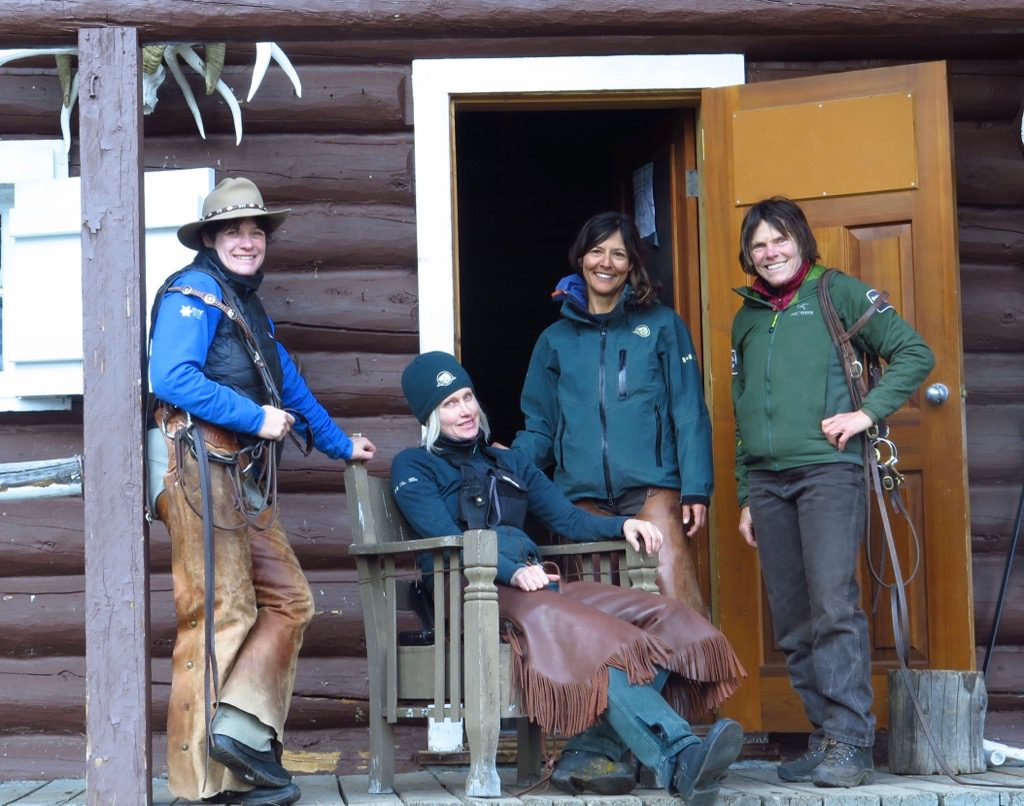
Lisa Paulson, Jenn Reimer, Sara Jaward and Julie Timmins at Scotch Camp
MH: What made the Warden Service such a unique organization? 2515
JT: I think it was unique in that it was a very much a team approach. Working together towards protection and having a vested interest in our success at protection. And just being outdoors! There’s always that element of indoor office work and dealing with an issue, coming together and solving the issue … great satisfaction.
MH: Do you have any lasting memories as a Warden?
JT: Well, I think all my backcountry trips were memorable, good memories. And I have good memories from working in the frontcountry too. At one time, it was called wildlife conflict and now it’s called human wildlife co-existence. There was a lot of variety within that function for sure. I think that some of my best memories though are of traveling the backcountry. The landscape north of Lake Louise, north of Banff … the Dormer, Red Deer, Panther and Clearwater Rivers as well the south end of the park … Palliser, Spray and Bryant and the whole Egypt Lake area. And of course the horses. My father and my uncle would both be smiling down on me knowing this is how I spent my career. I think I was around for enough time for the horses to go through the alphabet three times. There was Boxer and Duke at the start 34 years ago. The Ya Ha Tinda Ranch used to breed and train the horses but now they are picked up at auction. Every crop was given the next letter in the alphabet, if their names started with B’s one year then the next year they started with C and so on. I always figured the pecking order when it came to feeding was about age.
Mickey was one of my fav (favourite) horses. Laid back Mickey except when he got wind of a moose. A total nut case! But you could tie him off, ride down the trail, look over your shoulder and here comes Mickey just following along. Unlike other horses like Jappy that I would have to tow because if he was loose, he’d run around and rile up the other horses. But Mickey was a really nice horse. Skipper, Geronimo, Viking, I had so many excellent horses over the years, and they were all a result of excellent trainers at the ranch. Yeah, these horses had a lot of skill. In fact, the horses had more skills than a lot of the people that rode them.
MH: You said you were a horse person before you started? 2908
JT: My grandmother had a farm with horses. We started taking riding lessons at about age 6 and continued right up through high school. When I was at university, not so much but it was such a gift to get to Parks Canada and be on horses again. All the Parks horses were well trained and I never really had a horse that was difficult. I had horses that were lazy, but never difficult.
MH: Do you ever miss being a Warden? 3010
JT: I do miss the old Warden Service. Being trained in Law Enforcement, Visitor Safety and Resource Conservation skills was great. We got to do it all and any one of us could be called upon in many situations to help out. I miss the ecological integrity monitoring team that I worked with for the last 10 years AND I really miss the horses and the back country. There were so many special times, and I look at pictures of me in the backcountry and I’m still astounded. Did I ever have a great job! There was a day too when friends could come with us and they would help us cut up moose ha ha. In those days we traveled alone all the time. It seems the new people today aren’t comfortable traveling alone. In my latter years where I was still happy to go alone and people were kind of astounded but that’s just how we did it. It was really great that the dispatchers got to join us on trips. It was good for them to get familiar with the area they were dispatching for. Knowledge! At the time the visitor center staff would get out there too and that really enhanced the information they could provide to the park users. That was all of great value and I think that’s something that’s lost now.
MH: Do you have any photos of yourself as a warden that you would like to donate? Artifacts?
JT: I’ve sent a couple of me in the backcountry but I want to dig up some that are more task oriented, like the moose. In retrospect, I should have just said no, it weighs too much and that should get slung out. But I just kind of was talked out of it because I just couldn’t really evaluate the weight of what was left. So definitely some pretty pretty good experiences out there.
MH: What year did you retire?
JT: March 30 2021
MH: What do you enjoy doing in retirement? 3348
JT: I think being outdoors. And I’ve had the privilege of being able to go on a couple of backcountry trips as a volunteer. And actually one with Lisa Paulson fell through because one of the other girls hurt her knee. So that trip was postponed and then I was out of the province. So I missed that one. And skiing, lots of skiing, backcountry skiing. A lot of hiking, biking. There’s joy in just being outside. Someone said, “Oh Julie, you’ve got to have horses in your life.” At my age, I think maybe that ship has sailed. Using and loving horses for all those years with Parks Canada, I didn’t have to pay for shoeing. I don’t have to pay for feed. I didn’t have to pay for vet bills. I didn’t have to pay for transportation. I didn’t have to pay for anything, what a gift to have that close relationship with horses, and of course, they’re just part of a fleet of working animals that are managed by the Park, and I’m not sure I can sustain that kind of expense in my future. But if someone’s wanted me to go on a horse trip, I’d be right on it.
MH: Is there anything I haven’t asked you that you think I should know about the Warden Service? 3525:
JT: I sort of think that what I see now with Parks is so much strain because of high visitor use, and so much development to encourage even more visitors to come in. And it makes it very difficult for people to get to parts of the park they want to see because now they have to book ahead, and it’s all about revenue. It’s the permit to get into the park, it’s the buses, the accommodation, everything costs money and it’s not a cheap holiday for Canadians, when they were intended to be for all Canadians to enjoy. So I sort of see that that is becoming well, like they might say “loving your park to death”. And it’s going to have ultimately an impact on wildlife movement, and wildlife tolerance. And I am interested to know where it goes in the future. But it’s sad that it’s not preserved in the form that I remember it as.
There’s no one in the back country other than task related projects. I still think there is value in patrolling and letting the public know there is a presence out there. I had meant to mention Don Gorrie because I worked for one summer with him on trail crew in 1981, before I went to BC Parks, and he’s been there probably the longest of anybody, and he’s still there. He originally was part of the Warden Service but then got moved to Assets. He oversaw the trail maintenance, the cabin maintenance, all the assets frontcountry and backcountry. He continues to work with resource conservation out of their office, but he’s generally improving frontcountry facilities and trying to keep up backcountry needs.
So many stories and I wish I could have recollections of all of them all, or the best ones rather.
I’ll tell you about one horse adventure. I was with Viking who was Larry Gilmar’s horse before Larry retired. And I loved these horses that loved to walk and Viking was one of them. And I was helping a wolf biologist named Diane Boyd and we’re collaring wolves in the Panther River area. And I can still remember, we had to cross the river and I was on Viking. Horses don’t generally like what looks like soft boggy ground but I didn’t like the way the river looked because I thought it was pretty deep where he thought we should cross. So we’re having this little conversation I said, “I think we should cross over here.” And he’s saying, “But I want to go over there.” And I said, “I don’t really like the looks of that it looks a little deep.” and he’s going “No, no, no, I’m not going over there” (where is was a bit boggy). So I said, “Okay, all right. Do whatever you want. We’re going to go where you want to go”. He then takes one step off the bank and he goes right under the water and I’m wet right to my waist. And his head comes up with his ears flat back. He’s not happy as he steps up the other side. Meanwhile, the pack horse follows us in but the pack horse has two empty pack boxes on, which are like pontoons and they kept the horse afloat. So, he just bobs across. And there we are. Viking’s all pissed off. His ears are still back, and I’m wet from the waist down and Diane Boyd laughing. Sadly she did not get a picture. That was so unfortunate. So lots of stories about conversations with horses. And they usually were pretty funny.
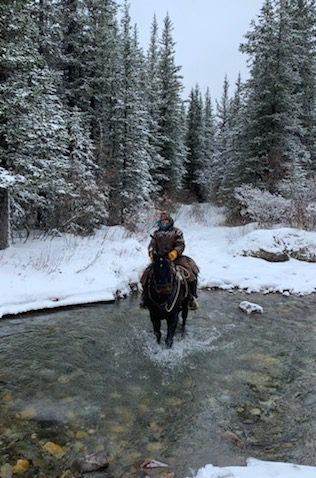
Crossing Panther River downstream of Windy cabin thankfully not deep!
MH: Anyone else to interview?
JT: Helene Galt if she hasn’t already, I’ll talk Elaine O’Neill into it…Lisa Paulson, Rhonda Owchar – neither retired so it will be a while. (All are on future interview lists).
I would like to think, and only the women of today could comment, but what I see is a whole generation of males that are very respectful, and appreciative of the skills that women bring to the office. And there seems to be a lot of good relationships there working relationships. Whereas back in my day, when I was new to the Warden Service, and I was also new to the ACMG (Association of Canadian Mountain Guides), it was very difficult for women, with men who thought there was no place for women in those careers. And it’s great to see the women of today have so many opportunities and not have the struggles that some of us had, when we were in those early careers. And that’s why people like Scott Ward, and Donny Mickle meant a lot to me, because they were great guys and just so accepting and really helpful. All of those guys were really good mentors. And that’s what it’s all about, kindness and mentorship and encouragement. And sharing the skills because women may have different skills, but they often complement each other the skills that men and women have. And there’s a lot of women that can do, leadership roles and management roles, and they’ve got good heads on their shoulders, and they’re thinkers and team workers. So yeah, it’s nice to see that.
Monique Hunkeler first started working with Parks Canada in 1989 as Secretary to Banff National Park Finance Manager. She moved into a position as Dispatcher for the Banff Park Warden Service and later worked within Banff National Park and Town of Banff’s IT departments. She is experienced with the interviewing, transcription and archiving process the Park Warden Service Alumni Society.
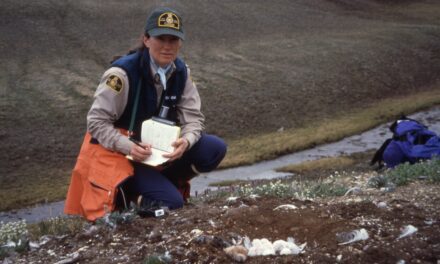
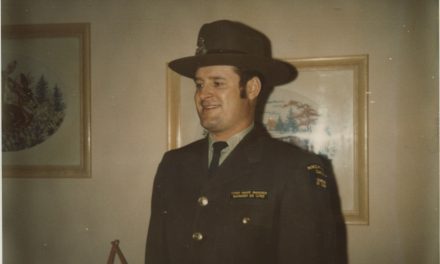
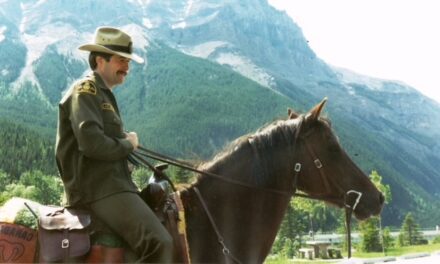
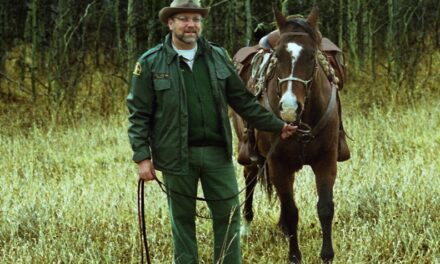
Thanks for sharing, great times with the old Warden Service.
Bob Thexton
CPW Kejimkujik (ret’d)